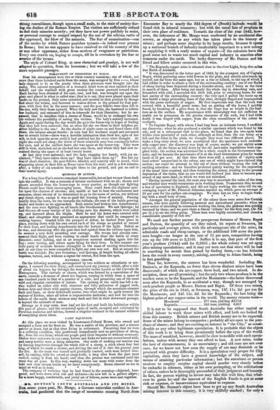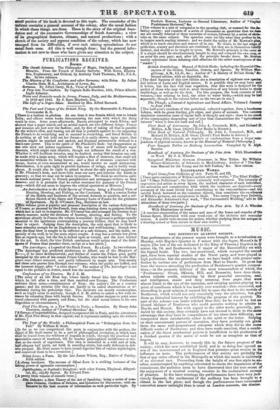MR. DUTTON'S SOUTH AUSTRALIA AND ITS MINES. FOR some years
past, Mr. Menge, a German naturalist resident in Aus- tralia, had predicted that the range of mountains running North from Encounter Bay to nearly the 32d degree of (South) latitude would be found rich in mineral treasures ; but with the usual fate of prophets in their own place of residence. Towards the close of the year 1842, how- ever, the inferences of Mr. Menge were confirmed by an accidental dis- covery, as singular as any which has taken place in the history of mines ; and perhaps more singular in its large results, because it opens up a national branch of industry incalculably important to a new colony as supplying it with a ready means of export—if the colonists have the good sense not to waste too much capital and industry in searches after treasures under the earth. The lucky discovery of Mr. Dutton and his friend and fellow settler occurred in this wise.
" The Kapunda copper mine is situated close to the river Light, forty-five miles due North of Adelaide.
" It was discovered in the latter part of 1842, by the youngest son of Captain Begot, whilst gathering some wild flowers in the plain, and shortly afterwards by myself, not far from the same spot, but on a rise or hillock, to the top of which had ridden in order to obtain a view of the surrounding country; one of our flocks of sheep having been dispersed during a thunder-storm, and I being at the time in search of them. After being out nearly the whole day in drenching rain, and benumbed with cold, I ascended this little hill, prior to returning home, for one last survey of the surrounding country: the very spot I pulled the horse up at was beside a large protruding mass of clay slate, strongly tinged and impregnated with the green carbonate of copper. My first impression was that the rock was covered with a beautiful green moss; but on getting off the horse, I quickly found, by breaking off a piece from it, that the tinge was as bright in the frac- ture as on the surface. My acquaintance with mineralogy was not sufficient to enable me to pronounce on the precise character of the rock, but I had little doubt it was tinged with copper, from the close resemblance of the colour to verdigris. • • •
" To Captain Begot, with whom I had long been on intimate terms, I confided my discovery; when he also produced a similar specimen which was found by his son; and on a subsequent visit to the place, we found that the two spots were within close proximity of each other, although at first, from the one being on s hill and the other in the plain, we thought they were two different places. TO make a long story short, we soon ascertained that the specimens were undoubt- edly copper ores: the discovery was kept of course secret; we got eighty scree surveyed, all the forms as laid down by the old land-sales regulations were coin, plied with; the section was advertised for a whole month in the Government Ga- zette, and we became the purchasers of it at the fixed Government price for waste lands of 11. per acre. At that time there were still a number of eighty-acre land orders runexercised in the colony, any one of which might have claimed this section; nor could we attempt to buy one of them without running the risk of exciting attention: and we therefore preferred quietly waiting for the expiration of the usual time required, and then tendering the money, trusting to the general depression of the times, that no one would feel inclined just then to become pos- sessed of any more land; in which we were not mistaken.
"Having secured the land, the next step was to ascertain the value of the ores, and whether they would remunerate us in working them. To ascertain this, we sent a box of specimens to England; and did not begin working the mine till the en- couraging report of Mr. Perceval Johnston reached us, which gave an average of 23 per cent for the surface out-croppings. We then lost no time to begin work- ing with a small body of men. • •
Amongst the general population of the colony there were some few Cornish miners, who were quietly following pastoral and agricultural pursuits: when ws gave notice of intending to commence working the mine, the pickaxe was q resumed by them; and we gave them a liberal tribute' for the first year, (3s. 64. per 11.,) to set the thing going. These men were highly successful, and raised.; considerable quantity of rich ore."
We need not further pursue the prosperous fortunes of Messrs. Bagot and Dutton, the quantity of ore they raised, its repute at Swansea, its particular and average prices, with the advantageous site of the mine, its admirable roads and cheap cartage, or the additional 100 acres the part. nere bought—no longer at the rate of 1/. per acre, competition having run up the 100 acres to 2,210/. Suffice it to say, that part of the first year's produce (1844) sold for 6,2251.; the whole colony was set agog after mining speculations-' and it may yet turn out that more will be lost in searching for metals than gained by finding them,—as has hitherto been the result in every country, mining, according to Adam Smith, being in fact gambling. Thus far, however, the success has been wonderful. Including Mr. Dutton's, or the Kapunda, no fewer than eleven distinct mines have been discovered ; of which six are copper, three lead, and two mixed. In de- scription, these are all promising ; but the only two whose produce is in the market seem to be the Kapunda and the Montacute—the latter discovered soon after the Kapunda, in as accidental a way, though not managed by such prudent people as Messrs. Dutton and Begot. Of these two mines, the price of the ore in 1845, at Swansea, was, 13/. us. 2d. per ton for the Montacute, and 241. 15s. 3d. for the Kapunda ; the last being the highest price of any copper-mine in the world. The money returns were-
Moutacute 277 tons, yielding £3,754 Kapunda 243 tons, yielding 6,017
It is not to be supposed that South Australia has either capital or skilled labour to work these mines with effect, and both are looked for from this country. British miners and British money are to be exported. Some of the mines belong to companies ; probably all are open to the par- chase of shares ; and they are exciting an interest in "the City," as consi- derable as any other legitimate speculation. It is probable that the object of this work is to bring them prominently before the eyes of the world. The mass of mankind, however, should be slow to meddle with such specu- lations, unless with money they can afford to lose. A new mine, under the best of circumstances, is an uncertainty ; and old ones are not over sure, for we know not how soon the supply of ore may diminish or be procured with greater difficulty. It is a speculation very proper for City capitalists, since they have a general knowledge of the subject, and means of attaining particular information ; but the annuitant or person anxious to employ surplus capital should ponder very closely before he embarks in schemes, either at his own prompting, or the solicitations of others, unless he is thoroughly persuaded of their judgment and honesty. In fact, the person wishing to invest may take this with him, that what- ever he gains be.--ond the interest of the English Funds is got at some risk or expense, or inconvenience equivalent to expense. Should Mr. Dutton's object have been to get up any South Australian mining interest in this country, it is very skilfully masked ; for only a Small portion of his book is devoted to this topic. The remainder of the Volume contains a general account of the colony, after the usual fashion in which these things are done. There is the story of the original foun- dation and of the successive Governorships of South Australia ; a view Of its geographical features, climate, and natural productions ; with a sketch of the society, and p7sent condition of the colony, which has now emerged from its difficulties, if over rash mining speculations do not entail fresh ones. All this is well enough done ; but the general infor- mation is not new to those who have given any attention to the subject.



























 Previous page
Previous page